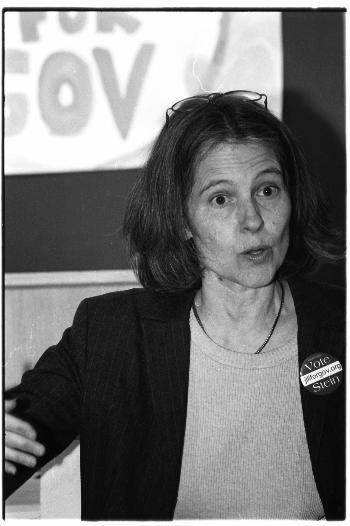
News
Summers Will Not Finish Semester of Teaching as Harvard Investigates Epstein Ties

News
Harvard College Students Report Favoring Divestment from Israel in HUA Survey

News
‘He Should Resign’: Harvard Undergrads Take Hard Line Against Summers Over Epstein Scandal

News
Harvard To Launch New Investigation Into Epstein’s Ties to Summers, Other University Affiliates

News
Harvard Students To Vote on Divestment From Israel in Inaugural HUA Election Survey
Harvard Greens Host Stein Talk

Continuing her effort to recruit students to her campaign, Green Party gubernatorial candidate Jill E. Stein ’73 said grassroots democracy is the key to Massachusetts’ future in a campus talk yesterday.
Although her locally-driven campaign has a small infrastructure and an even smaller budget, Stein spoke confidently of her electoral chances.
“I think we do potentially have a very winable election,” she said. “If you have a message that resonates, it’s powerful.”
Stein addressed a group of about 20 students and local residents in Boylston Hall for about an hour, touching on topics from the environment to public housing.
Stein said protecting the environment is at the top of her agenda. Stein called for the adoption of more sustainable economic development practices, expressing concern about toxin levels in the water supply, atmospheric pollution and global warming.
“We’ve polluted the biosphere and our bodies globally,” she said.
She also outlined her platform on social issues, explaining her plans for implementing universal healthcare and affordable housing.
By trimming wasteful government spending and “retrieving” tax revenues from the wealthiest one percent of the population, Stein said these programs—commonly thought of as being costly—could work while only minimally affecting the economy.
And Stein railed against dirty politics and special interests, contrasting them to the Green Party’s philosophy of grassroots politics.
“Those who fund government are those that government serves,” Stein said. “The lynchpin to solving [these problems] is taking our government back.”
At the conclusion of her talk, Stein, who is a medical doctor, practiced her bedside manner on the group, asking those in the room to share with her their individual concerns.
Stein took notes as students and community members voiced their feelings on everything from special interests to gay and lesbian issues.
She also stressed that she still needs thousands of campaign contributions before she can receive public funding as a Clean Elections candidate.
Under the Massachusetts Clean Elections laws, Stein could receive over $1.5 million in public money—but only if she collects 6,000 campaign contributions between $5 and $100. Currently, she remains more than 4,000 contributions shy of that mark.
“The real hurdle for us is to get those 6,000 contributions,” Stein said.
The event was co-sponsored by the Institute of Politics (IOP) and the Harvard Greens, which was recently approved as an official student organization.
With about five or ten committed members and a mailing list of about 50, the group is trying to establish a “strong presence” on campus, said Carolina S. Johnson ’04.
Besides yesterday’s event, the Harvard Greens are also planning two forums with the IOP on Clean Elections and local politics in the spring.
The group has also canvassed Brattle Square during the weekends, collecting about 30 qualifying contributions.
“It’s a lot of grunt work,” Johnson said. But, “if we can’t get those done then the campaign fizzles out.”
Want to keep up with breaking news? Subscribe to our email newsletter.
